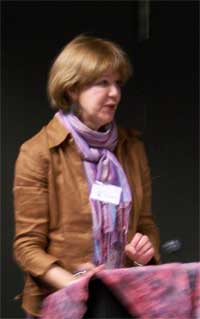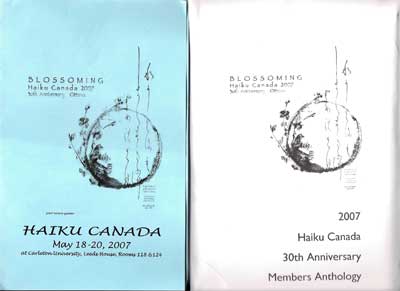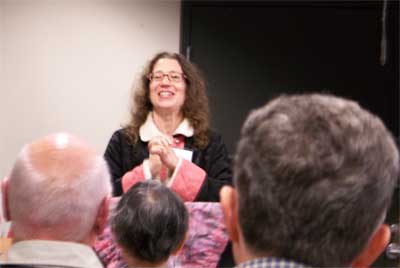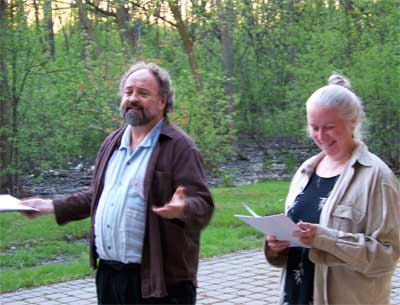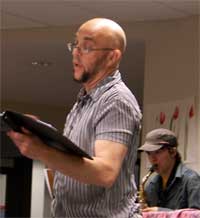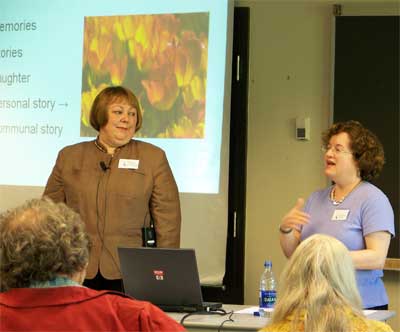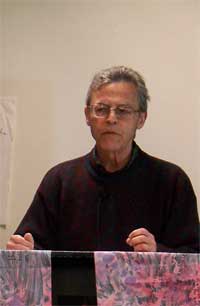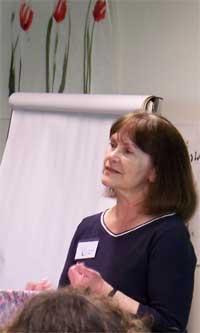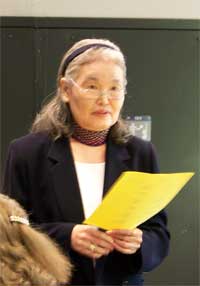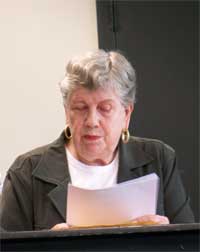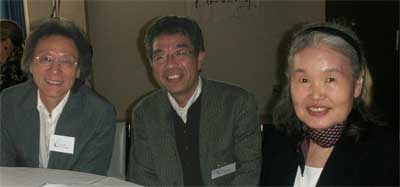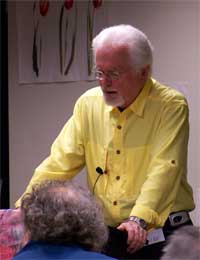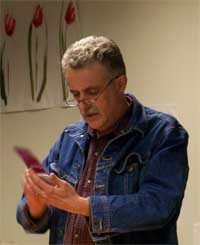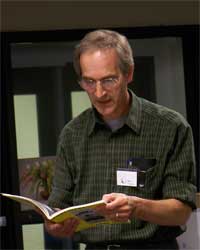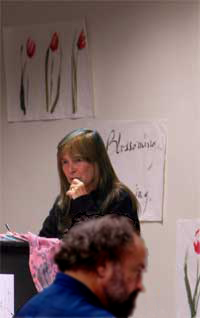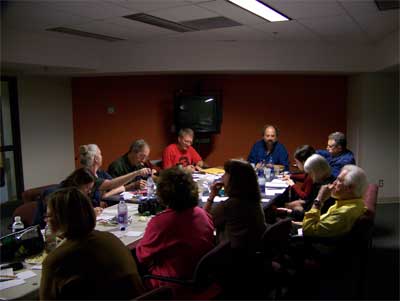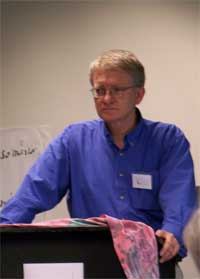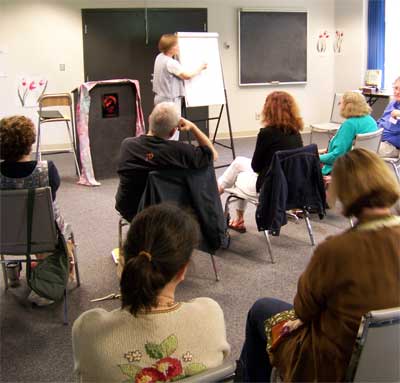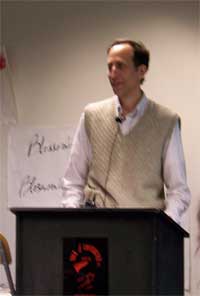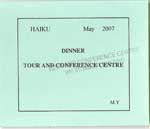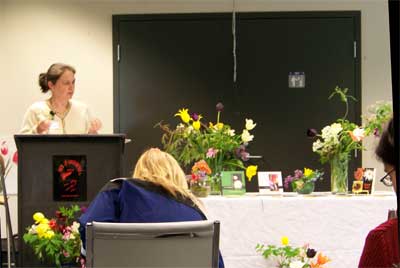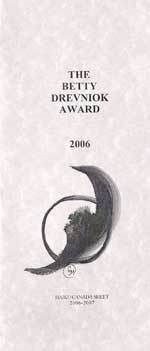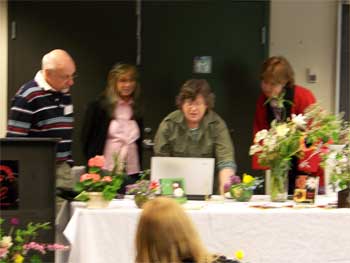The Program at
the Haiku Canada Conference 2007 (a review)
Photos, Scans, and Text by William J. Higginson
except as otherwise noted
|
After registration (Friday, 4–5 p.m.), setting up displays in the book room and throughout the bottom floor of Leeds House (our main quarters and site of most events), and an evening meal, Terry Ann Carter and Haiku Canada President DeVar Dahl opened the conference at 7 p.m. Terry Ann was the coordinator of the weekend. Here, she introduces the first presenters . . . |
The blue (or pink) program for the weekend lists dozens of events, with the much anticipated first being Marco Fraticelli and Philomene Kocher handing out copies of the 2007 Haiku Canada 30th Anniversary Member's Anthology, an envelope filled with individual sheets prepared by each participating member, more than 80 in all. We spent about a half hour leafing through the sheets, pointing out some of our favorites to our neighbors, and generally enjoying the relaxed excitement that would pervade the entire weekend. A few copies of the anthology are still available; contact Haiku Canade through their web site, at http://www.haikucanada.org/. |
|
At about 8 p.m., Angela Leuck presented two books, Tulips, an anthology of haiku about the popular flowers—very a propos with the Ottawa Tulip Festival in full swing—and her own Flower Heart Haiku, which may be seen on the books page here. Above, Abigail Friedman told us about the fun of her personal involvement with Japanese haiku and one of its top masters, Momoko Kuroda, and Momoko-sensei's many followers as captured in Abigail's engaging memoir, The Haiku Apprentice. |
Friday, 8:30 p.m., Marshall Hryciuk and Karen Sohne read renku they had written with others on Crete. |
|
Friday, 9 p.m., found us back indoors, with "performance haiku poet" Michael Dudley and saxophonist Dustin Stendel reprising the mode of Jack Kerouac's famous 1959 album Blues and Haikus with Zoot Sims and Al Cohn. But here, the poems were Michael's, and his intimate haiku sequences involving everything from the weirdness of our times to his obvious delight in his daughter. Following their performance, several members went off to a lounge for a late-night renku session, on which more below. |
Saturday, 9:30 a.m., after an "anonymous workshop" on haiku with Ann Goldring (more on this below), Marjorie Woodbridge and Philomene Kocher presented a fascinating hour on their work helping people with dementia connect with their lives and surroundings through a multiple-sense approach based in haiku. (Reminds me of George Swede's article on possible therapeutic uses of haiku, which appeared in the 1970s.) |
|
Saturday, 10:45 a.m., after a break that included socializing, visits to the book room, and other necessities, Raffael de Gruttola held forth on the need for haiku poets to practice renku—Japanese-style linked poems—in order to better understand not only haiku's origins as the opening verses of such collaborative poems, but the essence of haiku structure and movement. The basis of haiku's nature involvement, as well as its use of juxtaposition with subtle modes of connection, come from haikai no renga, or renku, as it is known today. |
In a brief (half-hour) session, Dina E. Cox gave us an overview of the history of senryu in Japanese, based on her researches in two excellent sources, R. H. Blyth's Japanese Life and Characeter in Senryu (Hokuseido, 1960) and Makoto Ueda's Light Verse from the Floating World: An Anthology of Premodern Japanese Senryu (Columbia U. Press, 1999), plus a number of others. She then brought us up to date with recent developments in both Japan and North America—senryu are not always funny, but always focused on human nature. (Blyth's book is rare; try inter-library loan; Ueda's is readily available.) |
|
After a relaxed lunch Abigail Friedman spoke again, this time on starting a haiku group, based on her experience founding Haiku Québec, where she mixed North American democratic elements with the anonymous workshop style of a Japanese kukai, or haiku meeting. After Abigail's talk Kozue Uzawa, pictured above, shared with us a number of the tanka of the iconoclastic Japanese poet Shuji Terayama (1935-1983), in translations she made in collaboration with Amelia Fielden, some from their recent book Ferris Wheel which includes modern tanka by many Japanese poets (available from Cheng & Tsui), and others from a new collection of Shuji's work, Kaleidoscope, forthcoming from Hokuseido Press. |
Saturday, 2:30 p.m., found us enjoying Muriel Ford's haiku, read by the poet. Haiku readings by Muriel and others, scattered through the weekend, provided aesthetic relief from the flood of information provided by many other presenters. Terry Ann and her helpers made a wise selection of readers, each of whom has a personal style in both writing and reading haiku. |
|
Saturday, 3–5 p.m., many of our people went out on a ginko to view the tulips, the Ottawa Tulip Festival having arrived at its final days. Check out the bilingual français/English Tulip Festival web site at http://www.tulipfestival.ca/. (The photo above is a substantially modified version of one on their site.) While most folks went on the ginko, many of us spent the time in the book room, or just hung out, talking with friends. See more at books and social-plus. |
I was too busy eating and talking to take photos at the great Haiku Canada banquet, but before it was over Claudia Coutu Radmore got this photo of three of the conference's Japanese guests, Mr. Toshi Yonehara, secretary to the Japanese Ambassador to Canada and a great supporter of the Kado Ottawa group; Prof. Makoto Nakanishi, from the Education Department of Ehime University, Japan; and Kozue Uzawa, professor at The University of Lethbridge and founder and editor of the Canadian tanka magazine, Gusts. A few more photos of conversations during a relaxed time after the banquet paraphernalia was cleared away give a sense of the ambiance; see social-plus. There are more program photos on this page, below. |
|
As the first event after the banquet, the board of Haiku Canada awarded George Swede a lifetime membership for his contributions to the organization (he was one of its founders, and continues to be actively involved), and to Canadian haiku in general. (George's resume reads like, well, like one of the movers and shakers in both the Canadian haiku and mainstream poetry scenes, which he is.) He graciously accepted this honor, in the process naming many others who have contributed mightily to the Canadian haiku scene and to Haiku Canada in particular, including several attending the conference. Then, he went on to one of the things he does best, presenting his scheduled talk, "The Blank Page, Haiku or Tanka?" |
The banquet and George's talk were followed by readings by LeRoy Gorman and Hans Jongman. LeRoy, on your left, finished his reading with a haiku written earlier that day in his pocket notebook. Hans, in a moving tribute to victims of war, read passages from a notebook he had found in a used book store, reminiscent of The Diary of Anne Frank, as a prelude to some of his own haibun. |
|
As the last formal event after the banquet Saturday evening, Claudia Coutu Radmore introduced a special edition of her own English-language haiku- and tanka-based version of the old Japanese karuta game, in which players match parts of poems. The game is explained—and you can play it!—here. |
Marshall and Karen led late-night renku sessions after the main program was completed both Friday and Saturday nights. See who was involved Saturday night here. |
|
Canadians take business seriously, as this photo of HC President DeVar Dahl suggests. He skillfully managed to keep this eye-opener meeting (at 8:30 a.m. Sunday) from running off the rails, and we were soon into the real business of the Haiku Canada weekend, haiku! (And I have to say that I did see DeVar smile a good deal, but not when I had the camera on him. Sorry for that!) |
Ann Goldring did a fine job of leading discussions of haiku submitted anonymously the previous evening. Judging by the substantial attendance at these sessions Saturday and Sunday a.m. by both experienced and new haiku poets, people found the workshop useful and pleasant. Kudos, Ann! |
|
Sunday, 10:30 a.m. After a break during which many people revisited the book room and the Turtle Light Press displays, Rick Black gave one of the most moving presentations of the weekend. Rick had served for many years as a correspondent for major international news organizations in Israel and Palestine, and recounted some of the horrors and joys of that time. After leaving the Middle East and moving around a bit in the US, along with further studies including training in the book arts, he married and settled in Highland Park, New Jersey, where he recently established Turtle Light Press, publishing carefully crafted hand-made books. He concluded his talk by reading haiku capturing moments of war and peace from his overseas experience. (Turtle Light is running a haiku chapbook contest, deadline 1 Dec 2007. Look for a link to contest info on the above web site.) |
Did I mention that we ate? Of course, there was the Haiku Canada Banquet, Saturday evening. But we also ate a good three squares a day. Those staying a the conference venue, on the Carleton University campus, had most of their meals together in the Residence Commons dining hall—as did the participants in several other conferences going on at the same time. For more on this and other socializing at Haiku Canada, see social-plus. And the conference wasn't over yet! See more below. |
|
After lunch on Sunday, Angela Leuck spoke of "Approaching Beauty: Writing Haiku about Flowers". As you can see, her talk was filled with the real thing. And while tulips were certainly in evidence (she has edited an anthology of haiku about tulips, as well as one on roses), there were literally dozens of different kinds of flowers on display, illustrating her talk. At the end, she graciously distributed individual blossoms to those attending. |
The conference was drawing to a close, but first, there were several much-anticipated announcements and presentations. The first of these was the 2006 Betty Drevniok Award, winners of annual the Haiku Canada contest named in honor of co-founder and poet Betty Drevniok, long remembered for her poems, her helpfulness to others, and some early Haiku Canada weekends held at her home in northern Ontario. The top three winners and several honorable mention poems are included in the "Haiku Canada Sheet" pictured above, which was given out to those attending. (I'll let the organization's public announcement reveal the winners.) |
|
From the early days of Haiku Canada weekends, many kinds of Japanese-style linked poems have been an important part of the event, both artistically and socially. To close out the program, Marshall and Karen and others read the renku written during their two night-time renku sessions, and this was followed by Guy Simser, Claudia, Dorothy Howard, and Terry Ann, surrounded by Angela's flowers, reading a blind renga started by Dorothy and passed around from participant to participant throughout the conference, until 36 stanzas were done. (In a "blind renga", each participant sees only the stanza immediately before their own, so the finished work is a surprise to everyone.) Above, they are reading the text from Dorothy's laptop computer, where she had typed it all in upon completion. At 2:45 on Sunday, DeVar and Terry Ann offered a few closing remarks, and then we all said many, many good-byes, gathered our bags, and went our separate ways. Penny and I were still talking about the presentations we'd enjoyed and conversations with old friends and new acquaintances we'd had when we got home, late the next day. We both agreed, the Haiku Canada Weekend 2007 was a fine event that we had greatly enjoyed. Plans are already forming for next year's Haiku Canada Weekend. Perhaps we'll see you there! And, if you haven't already done so, take a look at the other—much shorter—web pages on books, freebies, karuta (the game of matching parts of well-known haiku and tanka), renku (on the night-time linked-poetry sessions), and social-plus (a few of the many social interactions at the conference, and a few other unclassifiable items). |
|
Copyright © 2007 William J. Higginson. Copyright in all materials is retained by the authors. All rights reserved. No material from this web site may be copied on other web sites, produced in printed copies, or otherwise reproduced except as explicitly stated on a particular page, or by permission of the authors in writing. Please do not e-mail copies of this web page; rather, send the URL: http://haikai.home.att.net/haiku/haikucanada07program.html/. This page first posted 26 May 2007 and last updated 6 June 2007.
Contact William J. Higginson at wordfield[at]att[dot]net.
